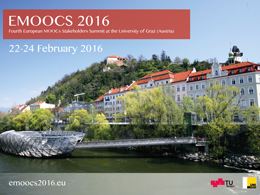The recording of my keynote at this year eduhubdays about „When Learning Analytics Meets MOOCs“ is now online available. The slides have been published right here.
Klicken Sie auf den unteren Button, um den Inhalt von tube.switch.ch zu laden.

Digitale Lehre an und rund um der Technischen Universität Graz
The recording of my keynote at this year eduhubdays about „When Learning Analytics Meets MOOCs“ is now online available. The slides have been published right here.
Klicken Sie auf den unteren Button, um den Inhalt von tube.switch.ch zu laden.
 Im Rahmen der heurigen DeLFI-Tagung hab ich kurz unser kürzliches begonnenes EU-Projekt, den IDeR-Blog, vorstellen können. Hier gibt es nun noch auch die zugehörige Publikation.
Im Rahmen der heurigen DeLFI-Tagung hab ich kurz unser kürzliches begonnenes EU-Projekt, den IDeR-Blog, vorstellen können. Hier gibt es nun noch auch die zugehörige Publikation.
Zusammenfassung:
Viele Jugendliche haben mit Lese- und Schreib- oder Rechtschreibproblemen zu kämpfen. Werden diese nicht erkannt und gefördert, wirkt sich das im Erwachsenenalter negativ aus [SMH08]. In diesem Beitrag beschreiben wir ein Informationssystem für den deutschsprachigen Raum, das sich derzeit im Aufbau befindet und mit Hilfe von Learning Analytics versucht personalisiertes Lernen zu fördern. Die Zielgruppe des Forschungsprojekts sind Kinder im Alter zwischen 8 und 12 Jahren. Schülerinnen und Schüler können Texte in Form von Blogeinträgen verfassen, welche automatisiert auf orthografische Fehler ausgewertet werden. Die qualitative Analyse wird mit Hilfe eines eigens dafür entwickelten Wörterbuches umgesetzt und den Lehrkräften zur Verfügung gestellt.
Zitation: Ebner, M., Taraghi, B., Ebner, M., Aspalter, C., Biermeier, S., Edtstadler, K., Gabriel, S., Goor, G., Gros, M., Huppertz, A., Martich, S., Steinhauer, N., Ullmann, M., Ziegler, K. (2015) Design für eine Plattform zum Schreibenlernen im Grundschulalter. In: Proceedings of DeLFI Workshops 2015 co-located with 13th e-Learning Conference of the German Computer Society (DeLFI 2015)München, Germany, September 1, 2015, S. 118-122.
My today’s keynote at the eduhub days 2016 (program) is about Learning Analytics with a special focus to MOOCs. Especially I am talking about our experiences we gathered in the last month and give an overview about our research studies. Enjoy the slides:
Klicken Sie auf den unteren Button, um den Inhalt von www.slideshare.net zu laden.
 We are getting closer and closer to the conference date – EMOOCS 2016 will happen from 22th – 24th of February. Don’t forget to register for the conference.
We are getting closer and closer to the conference date – EMOOCS 2016 will happen from 22th – 24th of February. Don’t forget to register for the conference.
In our preconference MOOC another two videos will be presented this week. This time there will be one about Learning Analytics and MOOC and another one about completion rate. So two hot topics, don’t miss them.
Ich habe für die letzte Ausgabe des L.A.multimedia Magazin einen Kurzbeitrag zu „Wozu Learning-Analytics-Applikationen im Mathematikunterricht?“ verfasst, der nun hier erschienen ist.
Zusammenfassung:
Learning Analytics ist noch ein sehr junges Forschungsgebiet, da es erst seit wenigen Jahren infolge des Internets möglich ist, Daten zentral zu sammeln. Die Interpretation solcher Daten kann Lehrende nun dabei unterstützen den Unterricht individueller zu gestalten und Lernende gezielt zu fördern. Am Beispiel des Einmaleins- Trainer wird gezeigt welche Aussagen getroffen werden können und welche Potentiale Datenanalyse für den Lehr- und Lernbereich haben kann.
Zitation: Ebner, M. (2015) Wozu Learning-Analytics-Applikationen im Mathematikunterricht?. L.A. multimedia, 3-2015, S. 40-41
Unsere Publikation über das IDER-Blog-Projekt mit dem Titel „Schreiben – Rechtschreiben lernen und Lesen mit der Plattform Individuell Differenziert Rechtschreiben mit Blogs – kurz IDeRBlog“ ist in der neuesten Ausgabe der LA-Multimedia erschienen.
Zusammenfassung:
Schreiben und Lesen ist eine der grundlegenden Fertigkeiten, die in der Schule vermittelt wird. Durch die Existenz von Computern, Tablets und Handys werden den Schülerinnen neue Zugange zum Schreib- und Leselernlernprozess ermöglicht. Diese greift das Erasmus + Projekt IDeRBlog auf, indem es für das Schreiben eine Internetplattform mit vielen Möglichkeiten zur Verbesserung der Rechtschreibung zur Verfügung stellt.
[Full Article at ResearchGate]
Zitation: Gros, M., Steinhauer, N., Ebner, M., Taraghi, B., Ebner, M. Aspalter, C, Martich, S. , Edtstadler, K., Gabriel, S., Huppertz, A.,, Goor, G., Biermeier, S. & Ziegler, K. (2015) Schreiben – Rechtschreiben lernen und Lesen mit der Plattform Individuell Differenziert Rechtschreiben mit Blogs – kurz IDeRBlog. LA Multimedia, 04/2015. S. 22-24
Our publication about the Learning Analytics implementation within the IDER-blog procject has been published: „Improved German Spelling Acquisition through Learning Analytics“.
Abstract:
Many pupils struggle with the acquisition of the German orthography. In order to meet this struggle a web based platform for German speaking countries is currently developed. This platform aims to motivate pupils aged 8 to 12 to improve their writing and spelling competences. In this platform pupils can write texts in the form of blog entries concerning everyday events or special topics. Since the core of this platform consists of an intelligent dictionary focussing on different categories of misspellings, students can improve their own spelling skills by trying to correct their mistakes according to the feedback of the system. Teachers are informed about specific orthographic problems of a particular student by getting a qualitative analysis of the misspellings from this intelligent dictionary. The article focuses on the development of the intelligent dictionary, details concerning the requirements, the categorization and the used wordlist. Further, necessary information on German orthography, spelling competence in general and the platform itself is given. By implementing methods of learning analytics it is expected to gain deeper insight into the process of spelling acquisition and thus serves as a basis to develop better materials on the long run.
[Full article at ResearchGate]
Reference: Edtstadler, K., Ebner, M., Ebner, M. (2015) Improved German Spelling Acquisition through Learning Analytics. eLearning Papers, 45, pp. 17-28
Im Rahmen eines Webinars habe ich unsere Learning-Analytics-Applikationen vorgestellt. Das Webinar „So macht Mathelernen Spaß!“ steht als Aufzeichnung auch auf YouTube zur Verfügung:
 Der Mulitplikationstrainer, Teil unseres Learninglab , erhält nun auch eine iOS-App, die einerseits einen Trainingsmodus und andererseits eben den Übungsmodus implementiert hat.
Der Mulitplikationstrainer, Teil unseres Learninglab , erhält nun auch eine iOS-App, die einerseits einen Trainingsmodus und andererseits eben den Übungsmodus implementiert hat.
Expand your multiplication skills.
You can start a short game over ten rounds or an online game.
If you reach enough points at the short game, you unlock the next level with higher complexity.
Or our Online-System creates your multiplications. The system enables you to see your calculations and errors online.
So you are able to analyze your errors and improve your skills.
If you play the online mode, you need an account from the learning lab of the TU Graz.
Um den Übungsmodus spielen zu können ist eine Registration bei https://schule.learninglab.tugraz.at notwendig.
Our publication about „Development of an English Vocabulary Trainer for German Speaking Pupils and other Beginners of English with Focus on Learning Analytics“ in the International Journal of Computer and Information Technology got published.
Abstract:
Neuhold [1] developed a software for children to practice additions and subtractions, including tools to analyze the learner produced data to better understand this learning process and help teachers in finding appropriate measures to eliminate mistakes. Following this example we investigated in second language vocabulary acquisition (cf. [2, 3, 4]) and developed a functional prototype of an English vocabulary trainer in the field of learning analytics (LA), which aims at assessing learners’ vocabulary competence to support teachers in decisions on appropriate interventions. The software prototype is mainly based on the lexical approach to language teaching (cf. [2, 5, 3]), our own teaching experiences and especially theories on the mental lexicon (cf. [2, 6]) were used for the realization of various analysis tools. Our working prototype points out how learning analytics can help to improve language learning in future classrooms.
Reference: Gröbel, R., Ebner, M., Ebner, M. (2015) Development of an English Vocabulary Trainer for German Speaking Pupils and other Beginners of English with Focus on Learning Analytics, International Journal of Computer and Information Technology, 4(5), pp. 836-842